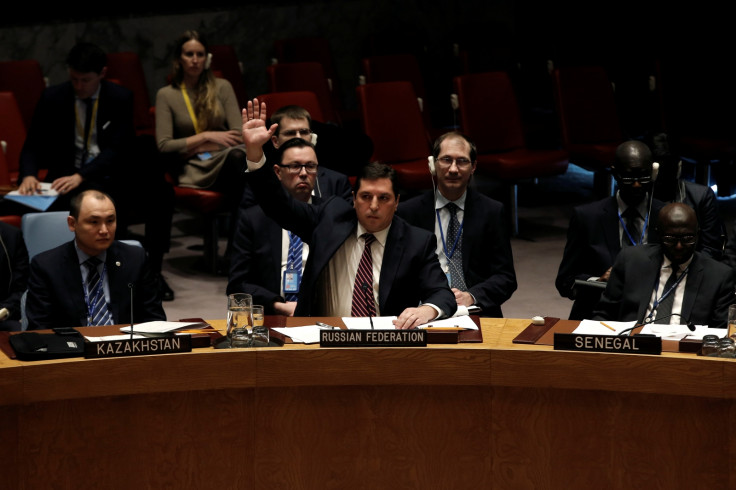Russia and China veto western-backed UN sanctions over alleged use of chemical weapons
UN Security Council resolution on sanctions against Syria was drafted by US, UK and France.
Russia and China have vetoed a UN Security Council resolution that would have imposed sanctions on Syria after the alleged use of chemical weapons during the civil war.
Drafted by the US, UK and France, the measure, discussed on Tuesday 28 February, won nine votes from the 15-member council, but China, Russia and Bolivia opposed it.
Three other countries - Kazakhstan, Ethiopia and Egypt - abstained.
This was Moscow's seventh veto in five years to save President Bashar al-Assad's Syrian government from sanctions.
Beijing has also vetoed six UN Security Council resolutions on the embattled nation since the civil war began in 2011.
Both China and Russia hold veto powers at the council alongside three other permanent members, the UK, US and France. Each resolution needs nine votes in support, and no vetoes from the five permanent members.
Significantly, this is the first time that pro-Assad Russia and the Trump administration have clashed, after the US President vowed to improve ties with Moscow.
The resolution, which was proposed by Great Britain and France but endorsed by the US last week, banned the sale of helicopters to Syria, and would have imposed sanctions against 11 Syrian commanders or officials and 10 groups linked to the alleged chemical attacks.

The Syrian military officials, and other entities, have been identified as having dropped chlorine-filled barrel bombs from helicopters onto rebel-held districts on at least three occasions in 2014 and 2015, according to a UN panel.
The use of chlorine as a weapon is prohibited under the 1997 Chemical Weapons Convention. The UN and an international chemical weapons watchdog, the Organisation for the Prohibition of Chemical Weapons (OPCW), found that Syrian government forces have used the weapons.
Syria, who deny carrying out chemical attacks, agreed to destroy their chemical weapons stockpile in 2013 under an agreement negotiated between the Kremlin and Washington.

The US ambassador to the UN, Nikki Haley, who has previously described the use of chemical weapons as "barbaric", said following the vote, according to the New York Times: "It is a sad day on the Security Council when members start making excuses for other member states killing their own people.
"The world is definitely a more dangerous place."
The BBC reported that Russian President Vladimir Putin said sanctions against Syria would be "totally inappropriate", saying "it would only hurt or undermine confidence" in ongoing peace talks.
China's UN ambassador, Liu Jieyi, said: "We oppose the use of chemical weapons" but said it was too soon to impose sanctions as investigations into their use were still ongoing.
In response to the vote, UK ambassador to the UN Matthew Rycroft said: "Not taking action against chemical weapons use undermines confidence in the international community's ability to tackle flagrant violations of international law - and undermines the trust of Syrians affected by these horrific attacks."

© Copyright IBTimes 2024. All rights reserved.






